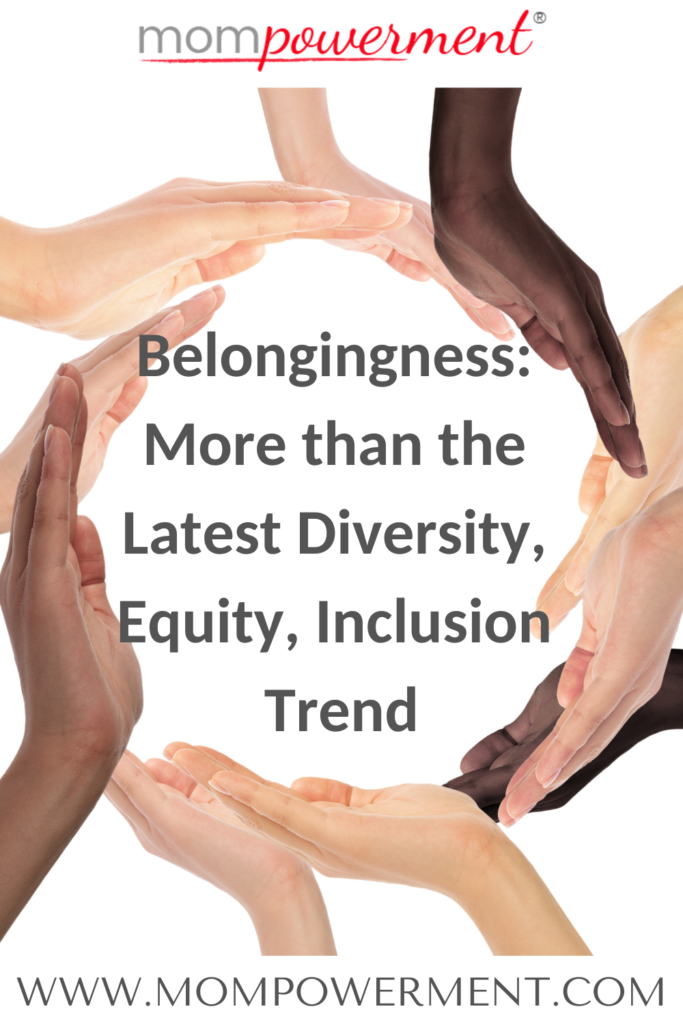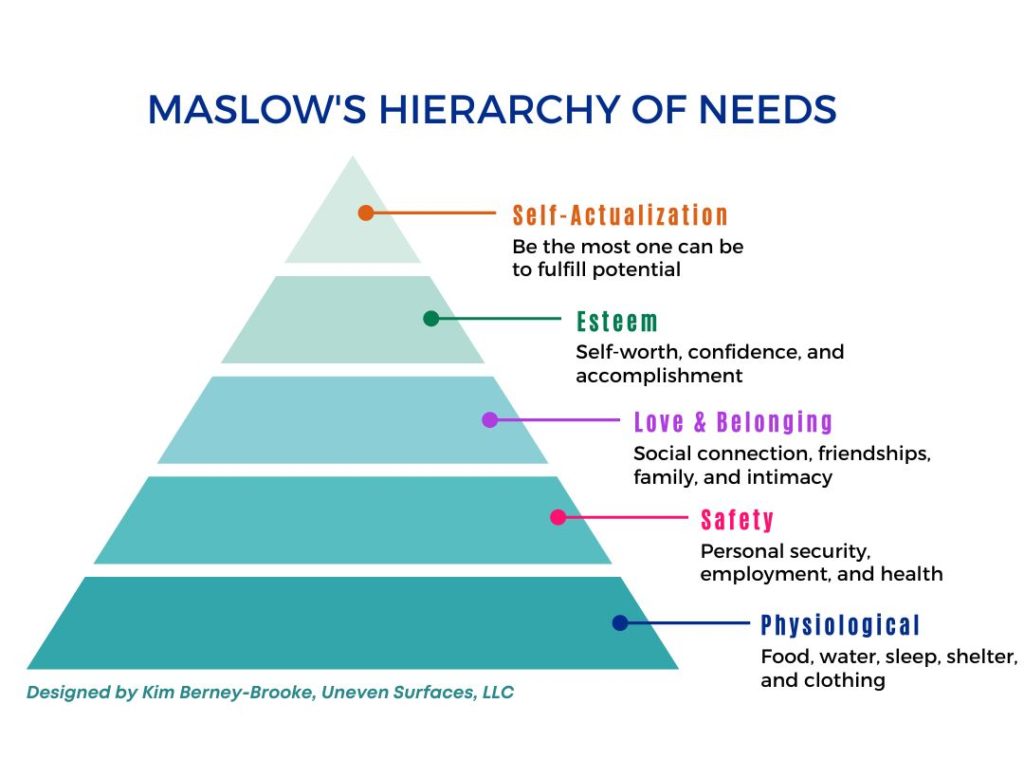
Several years ago Kim Berney-Brooke and I served on the same advisory board for an initiative to support working mothers. I appreciated her insights during our board meetings. I was thrilled to hear about her graduate studies, and I’m even more excited to hear about her new endeavor as an organizational psychologist and belongingness consultant. She shares an interesting perspective in this series for employees, managers, senior leaders, HR professionals, and entrepreneurs interested in adding to their teams. You will see that belongingness matters.
February is the month of love, largely thanks to Valentine’s Day. As a working mom, Valentine’s Day may invoke dread, as in “I need to get Valentine cards for my kid’s class!” Or it can also inspire and ignite the shared connection with those we are closest to. When we take a moment to reflect on our love for others, we don’t often consider love’s companion feeling, belonging. While you might not be thinking about it, belongingness matters.
Belonging as a basic need
Abraham Maslow developed a list of human needs to explain what motivates human behaviors and makes us fulfilled.
Love and belonging are coupled in the third band of the pyramid. Although Maslow originally depicted these needs as hierarchical, believing that each level needed to be mostly achieved before moving on to the next level of human needs, he realized that the order of these needs could be adjusted. He still maintained that each need was to be mostly fulfilled before moving on to the next one. The equivalent of “leveling up” in a video game.
However, some researchers and psychologists have been rethinking Maslow’s linear fulfillment of these needs and recognize that a person could be motivated to fulfill multiple needs nonlinearly. So love and belonging are basic needs for many people, even if they have not mostly fulfilled their physiological or safety needs.
We must recognize that our social needs fuel love and belonging. These social needs significantly impact how we show up every day for ourselves, our families, those we care for, our neighbors, our communities, and our co-workers, teammates, and clients. Whether you’re looking at life or work, belongingness matters.

Companies and belonging
Many companies are beginning to understand the importance of this fundamental human need to belong. Some are updating their diversity, equity, and inclusion (DEI) statements that center belonging at the heart of their DEI programs and philosophy. These firms may declare that they provide their employees with a “sense of belonging” in the workplace. Firms that consult on improving workplaces are finally producing content that speaks to creating a belonging culture and cultivating belonging in teams. Business and strategy experts like Deloitte, Gallup, Gartner, and McKinsey & Company talk about providing employees a “sense of belonging.”
Is a sense of belonging enough?
In a recent LinkedIn post, Paul Haury, a Belonging and Executive Performance Coach (whom I met through Suzanne), points out that we wouldn’t work for a “sense of paycheck.” He also notes that we wouldn’t allow a friend or ourselves to “commit to someone for a sense of love.” A “sense of” anything is only a vague notion or sensation. When we have a strong feeling, whether love, belonging, or excitement, we state the feeling outright. We don’t qualify it by prefacing the emotion with a “sense of…”. So why have we accepted that providing a “sense of belonging” in the workplace is enough? (You can read more from Paul’s blog on this idea.)
If you’re only creating a sense of belonging, do employees actually feel they belong? It doesn’t appear that a sense of belonging is enough. If organizations want to know why so many women leaders left their firms over the past few years, they might want to see if belonging is missing in their organization’s culture. In the McKinsey & Company and Lean In’s Women in the Workplace 2022 report, there is evidence showing that belongingness matters.
Despite at least 75% of companies participating in the Women in the Workplace 2022 study reporting that their manager training includes “Fostering a sense of inclusion and belonging,” there remains a profound lack of belongingness. Fostering this “sense of belonging” rather than focusing on true belonging resulted in a pipeline issue for these organizations.
When you feel that you don’t belong
The impact of feeling that you don’t belong in the workplace can be devasting. Neuroscientists have conducted experiments showing our brains light up in the same regions for social rejection (essentially the feeling of not belonging) and when we are physically hurt. When we experience social rejection, the saying “it feels like we were punched in the gut” has validity.
The Women in the Workplace 2022 study reported that “for every woman at the director level who gets promoted to the next level, two women directors are choosing to leave their company” (p. 7). If companies are interested in having more women, especially those with diverse identities, something needs to shift.
The women’s reasons for leaving their organizations provide answers to what needs to change. These women did not feel cared for, respected, or accepted, which are the foundational components for belonging. They were not cared for due to a lack of recognition or reward for their essential work supporting employees’ well-being and inclusion. These women leaders had their judgment questioned, and they were often mistaken as more junior employees, showing disrespect. They knew they were not accepted, noting their identities in their gender or being a parent had been a factor in being passed over for promotions. Essentially, they didn’t belong. Yes, belongingness matters!
Digging into belonging
So, yes, belongingness matters. And all of this may have you wondering how belonging can be cultivated in the workplace. During the summer of 2021, I spoke with several working moms about their experiences with their employers. These conversations were part of a requirement for my master’s program at Adler University, where I learned more about Alfred Adler and Adlerian Psychology principles. It’s no surprise that belongingness is a core need for our overall well-being.
Three conversations stand out to me where these women genuinely belonged in their workplaces. There were three elements that their employers provided that helped create belonging for these moms. They felt cared for, respected, and accepted. These are the essential building blocks for belonging.
You may now be wondering what their employers did that helped these moms belong without compromising who they were. Or maybe you are considering if there is anything you may bring back to your employer or your teams, so everyone feels they belong too. You’ll have to tune in to Part 2 of how belongingness matters to hear more about what these moms said and what their employers did.
What does belonging feel and look like for you? How do you create belonging in personal situations and in professional circumstances?

Kim Berney-Brooke is an organizational psychologist and belongingness consultant who guides teams and their leaders in creating environments where everyone feels cared for, respected, and accepted for who they are. With more than 20 years of business leadership experience, Kim understands that when we belong, we all excel exponentially as individuals and as a team.
Find out more about Kim and her consulting firm, Uneven Surfaces, LLC.


